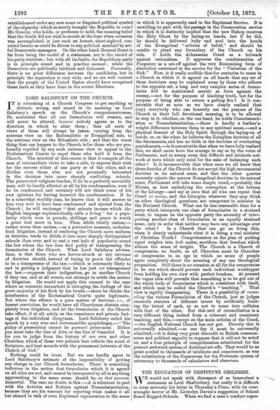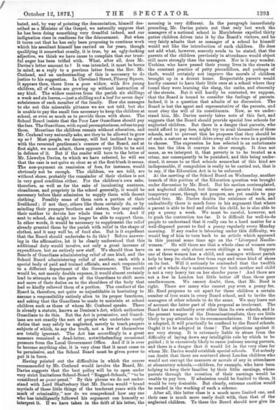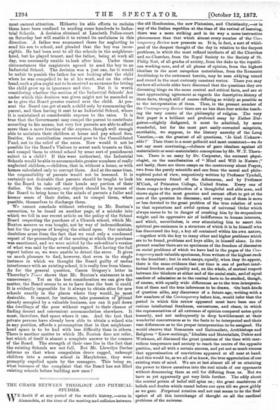THE EDUCATION OF DESTITUTE CHILDREN.
would not speak with disrespect of so benevolent a statesman as Lord Shaftesbury, but really it is difficult to treat seriously his letter in Thursday's Times, with its over- wrought horror at Mr. Llewelyn Davies's suggestion of School Board Ragged-Schools. When we find a man's conduct repro- bated, and, by way of pointing the denunciation, himself des- cribed as a Minister of the Gospel, we naturally suppose that he has been doing something very dreadful indeed, and our indignation rises in readiness for the cl6nouement. But when it turns out that he has only been proposing to continue work which his assailant himself has carried on for years, though qualifying it somewhat cruelly, it is true, by an ugly-looking adjective, we think we have cause to complain that our trust- ful anger has been trifled with. What, after all, does Mr. Davies's letter amount to ? It was intended, it must be borne in mind, as a reply to a previous letter from the Rev. Mr. Coxhead, and an understanding of this is necessary to do justice to his suggestion. In Cleveland Street, Fitzroy Square, it appears then, there lives a poor widow, with five young children, all of whom are growing up without instruction of any kind. The widow receives from the parish six shillings a week and six loaves,—just a shilling and a loaf for seven days' subsistence of each member of the family. How she manages to eke out this miserable pittance we are not told, but she is unable to pay the small fees necessary to keep the children at school, or even so much as to provide them with shoes. The School Board insists that the Poor Law Guardians should pay the fees. The Guardians, with equal peremptoriness, refuse to pay them. Meantime the children remain without education, and Mr. Coxhead very naturally asks, are they to be allowed to grow up so ? Most people, we daresay, will feel inclined to agree with the reverend gentleman's censure of the Board, and at first sight, we must admit, there appears very little to be said in defence of it. But if the reader will turn to the letter of Mr. Llewelyn Davies, to which we have referred, he will see that the case is not quite so clear as at the first blush it seems. The non-payment on remission of fees, for instance, would obviously not be enough. The children, we are told, are without shoes, probably the remainder of their clothes is not in very good condition either. For the children's own sake, therefore, as well as for the sake of inculcating neatness, cleanliness, and propriety in the school generally, it would be necessary before their admission to supply them with decent clothing. Possibly some of them earn a portion of their livelihood ; if not they, others like them certainly do, or by minding their younger brothers and sisters, they may enable their mother to devote her whole time to work. And if sent to school, she might no longer be able to support them. In other words, it would be necessary to supplement the relief already granted them by the parish with relief in the shape of clothes, and it may well be, of food also. But is it expedient that the Board should undertake to do this ? Before answer- ing in the affirmative, let it be clearly understood that this additional duty would involve, not only a great increase of expenditure, but an entirely new staff. We should thus have Boards of Guardians administering relief of one kind, and the School Board administering relief of another, each with a special body of paid and trained officials, and each responsible to a different department of the Government. The result would be, not merely double expense, it would almost certainly lead to attempts on the parts of the Guardians to shift more and more of their duties on to the shoulders of the body that had so kindly relieved them of a portion. The conduct of the Board is, therefore, not quite so unjustifiable in hesitating to tissume a responsibility entirely alien to its proper functions, and asking that the Guardians be made to maintain at school children such as those of whom Mr. Coxhead speaks. There is already a statute, known as Denison's Act, which authorises Guardians to do this. But the Act is permissive, and Guard- ians are not exactly the sort of people who undertake costly duties that may safely be neglected, merely to teach paupers subjects of which, to say the truth, not a few of themselves are totally ignorant. The Act has accordingly in a great measure remained a dead-letter, notwithstanding occasional pressure from the Local Government Office. And if it is ever to become anything else, it is very clear that it must cease to be permissive, and the School Board must be given power to put it in force.
Having pointed out the difficulties in which the course recommended by Mr. Coxhead would involve the Board, Mr. Davies suggests that the best policy will be to open under very strict limitations School-Board "Ragged-Schools," "to be considered as quasi-penal." By this phrase we do not under- stand with Lord Shaftesbury that Mr. Davies would "brand myriads of these little things of the tenderest years with the mark of criminality," nor do we comprehend how any one who has intelligently followed his argument can honestly so interpret it. If we have taken in the drift of his letter, the meaning is very different. In the paragraph immediately preceding, Mr. Davies points out that only last week the managers of a national school in Marylebone expelled thirty gutter children driven into it by the Board's visitors, and he very fairly admits that as manager of a school he himself would not like the introduction of such children. He does not add what, however, scarcely needs to be stated, that the parents of the children previously in attendance would object still more strongly than the managers. Nor is it any wonder. Urchins, who have passed their young lives in the streets in the constant practice of petty peccadilloes, and perhaps of theft, would certainly not improve the morals of children brought up in a decent home. Respectable parents would hardly consent to have their little ones at a school where they found they were learning the slang, the oaths, and obscenity of the streets. But it will hardly be contested, we suppose, that the Board is bound to consider the feelings of parents. Indeed, it is a question that admits of no discussion. The Board is but the agent and representative of the parents, and must obey the will of its constituents. Now, as we under- stand him, Mr. Davies merely takes note of this fact, and suggests that the Board should provide special free schools for neglected children. But there is a danger that parents, who could afford to pay fees, might try to avail themselves of these schools, and to prevent this he proposes that they should be of such a nature as would drive away all who were in a position to choose. The expression he has selected is an unfortunate one, but the idea it conveys is clear enough. It does not mean, as we interpret it, that poverty is to be treated as a crime, nor consequently to be punished, and this being under- stood, it seems to us that schools somewhat of this kind are indispensable, if compulsion is really to be carried out, that is to say, if the Education Act is to be enforced.
At the meeting of the School Board on Wednesday, another branch of this portion of the Education question was brought under discussion by Mr. Reed. But his motion contemplated, not neglected children, but those whose parents from some temporary cause, though not paupers, are yet unable to pay school fees. Mr. Davies doubts the existence of such, and undoubtedly there is much force in his argument that where a parent is able to feed and clothe his child, he is also able to pay a penny a week. We must be careful, however, not to push the contention too far. It is difficult for well-to-do people to understand that it really can be a hard matter for a well-disposed parent to find a penny regularly every Monday morning. If any reader is labouring under this difficulty, we would beg of him to turn back to an article which appeared in this journal some time ago on the "Liverpool Needle- women." He will there see that a whole class of women earn on an average only about seven shillings a week. Suppose one of these women has a child, and manages without parish help to keep its clothes free from rags and some kind of shoes on its feet. Will it seriously be contended that the twelfth part of a whole day's maintenance for both mother and child is not a very heavy tax on her slender purse ? And there are not a few in London but little better Off than these poor needlewomen. We cannot doubt, then, that Mr. Reed is right. There are many who cannot pay even a penny fee. Mr. Reed proposes to set apart for these children a certain number of free seats in every Board school, and to invite the managers of other schools to do the same. We may leave out of account the latter part of this proposal as irrelevant. The Board has no authority over other than its own schools, and in the present temper of the Denominationalists, they are little likely to pay attention to its recommendations. If the scheme is adopted, it will practically be confined to the Board schools. Ought it to be adopted in these ? The objections against it are very strong. It is extremely liable to abuse from the difficulty of laying down any intelligible rule by which to be guided ; it is excessively likely to cause jealousy among parents, and there is a danger that it would let in the very class for whom Mr. Davies would establish special schools. Yet nobody can doubt that there are scattered about London children who would not corrupt the manners or morals of any in attendance at elementary schools,—children, for example, who have been helping to keep their families by their little earnings, whose parents through the cessation of their earnings would be unable to pay fees. If admission could be limited to them, it would be very desirable. But clearly, extreme caution would be needed in the working of such a scheme.
After all, this latter class is a much more limited one, and their case is much more easily dealt with, than that of the neglected children. To these the Board should now give its most earnest attention. Hitherto its able efforts to reclaim them have been confined to sending some hundreds to Indus- trial Schools. A decision obtained at Lambeth Police-court on Saturday last will enable it to extend its usefulness in this direction. A father was summoned there for neglecting to send his son to school, and pleaded that the boy was incor- rigible. He had been sent to all the schools in the neighbour- hood, but he played truant, and-the father, being at work all day, was necessarily unable to look after him. Under those circumstances the magistrate agreed to send the boy to an Industrial School. The decision was a just one, for it would be unfair to punish the father for not looking after the child when he was compelled to be at his work, and on the other -hand, such a plea ought not to be received as an excuse for letting the child grow up in ignorance and vice. But it is worth considering whether the section of the Industrial Schools' Act under which this decision was given might not be amended so as to give the Board greater control over the child. At pre- sent the Board can get at such a child only by summoning the parent, and then having it sent to an Industrial School, where it is maintained at considerable expense to the rates. It is true that the Government may compel the parent to contribute 'according to his means, but very few parents are able to afford more than a mere fraction of the expense, though well enough able to maintain their children at home and pay school fees. Besides, the contribution recovered goes to the Consolidated Fund, not to the relief of the rates. Now would it not be possible for the Board's Visitors to arrest such truants as this, and compel them to attend school by some sort of punishment suited to a child ? If this were authorised, the Industrial Schools would beable to accommodate greater numbers of really 'neglected children,—children, that is, without a home, or with homes calculated only to corrupt them. And at the same- time, the responsibility of parents would not be lessened. It is certainly not desirable that parents should be taught to look to the Board to take off their hands any portion of their duties. On the contrary, our object should be, by means of the Board to bring home to the minds of parents a fuller and keener sense of their duties, and to compel them, when -possible, 'themselves to discharge them.
We cannot conclude without referring to Mr. Buxton's correction, to be found on another page, of a mkitake into which we fell in our recent article on the policy of the School Board respecting the purchase of a Church school, which Mr. 'Buxton assures us was bought, not by way of indemnification, but for the purpose of keeping the school open. Our mistake doubtless arose from the fact that we read only a condensed 'report of the proceedings of the meeting at which the purchase 'was-sanctioned, and we were misled by the sub-editor's version of what was said by the several speakers. Not having the full report before us, we were unable to detect the error. It gives us much pleasure to find, however, that even in the single instance in which we thought the Board guilty of undue interference with an existing school, it is really free from blame. As for the general question, Canon Gregory's letter in Thursday's Times shows that Mr. Buxton's statement is not unnecessary. Yet on the best consideration we can give the matter, the Board seems to us to have done the best it could. It is evidently impossible for it always to obtain sites for new schools exactly in the places where they would,,lie most desirable. It cannot, for instance, take possession of—gind already occupied by a valuable business, nor can it pull down the dwellings of the poor without regard to their chance of finding decent and convenient accommodation elsewhere. It must, therefore, find space where it can. And the fact that private persons have already been able to obtain a school site in any position, affords a presumption that in that neighbour- hood space is to be had with less difficulty than in others. There is another matter to which Mr. Buxton does not refer, but which of itself is almost a complete answer to the censors of the Board. The strength of their case lies in the fact that the existing Schools are not full. But Mr. Llewelyn Davies informs us that when compulsion drove ragged, unkempt children into a certain school in Marylebone, they were promptly expelled again by the managers. This being so, what becomes of the complaint that the Board has not filled existing schools before building new ones ?




































 Previous page
Previous page